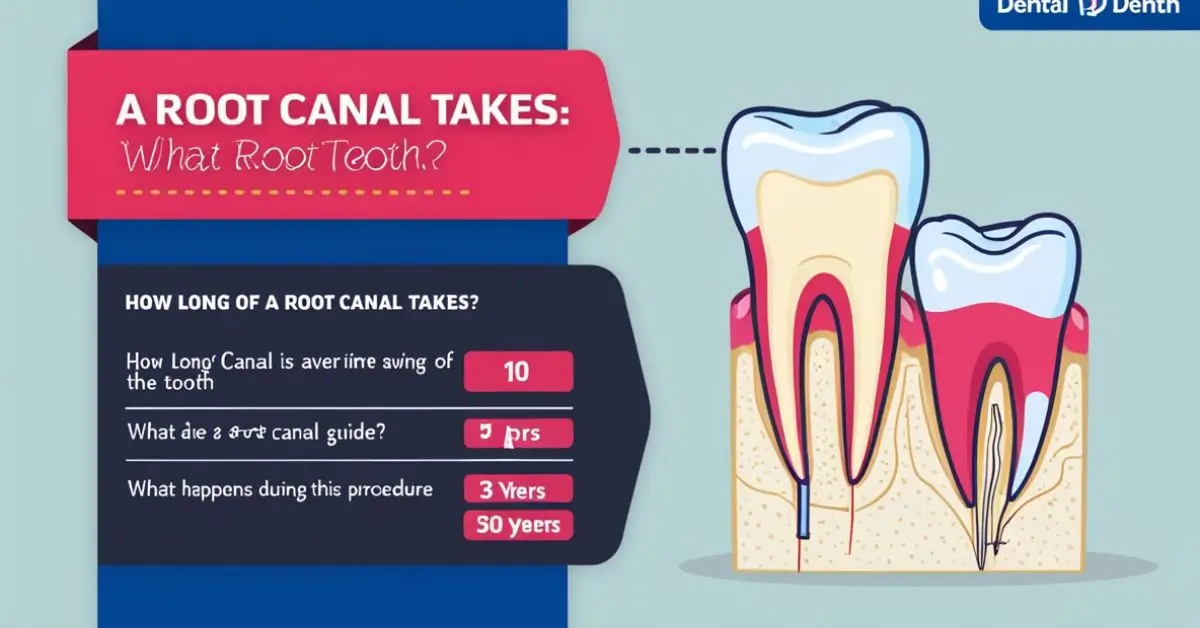A root canal is one of the most effective dental treatments for saving a tooth affected by decay or infection. While the term may bring to mind a lengthy or uncomfortable procedure, understanding its timeline and what to expect can help ease any concerns.
The duration of a root canal varies, but it’s influenced by factors like the complexity of the tooth, the number of canals, and the severity of the infection. In this comprehensive guide, we’ll break down how long a root canal takes, what influences the time, and what happens during and after the procedure.
Typical Duration of a Root Canal
A root canal procedure usually takes 30 to 90 minutes per session. Some cases might be completed in a single visit, while others may require two or more appointments. Here’s an estimate based on the type of tooth being treated:
- Front teeth (Incisors and Canines): These typically have one canal, and the procedure can be completed in 30–60 minutes.
- Premolars: Premolars usually have one or two canals, requiring about 60 minutes.
- Molars: With three or more canals, molars are the most time-intensive, often taking 90 minutes or more.
Factors That Influence Root Canal Duration
Several variables can affect how long a root canal takes, including:
1. Tooth Complexity
- Number of Canals: Teeth with multiple canals, like molars, take longer as each canal must be thoroughly cleaned and sealed.
- Curved or Narrow Canals: Certain teeth have intricate structures that require extra care, adding time to the procedure.
2. Severity of Infection
- If the tooth is severely infected, additional cleaning or medications might be necessary, potentially spreading the treatment across multiple visits.
3. Restorative Work
- After a root canal, the tooth typically needs a crown or permanent filling for protection. Whether this restoration is done during the same visit or later can affect the total time spent on the procedure.
4. Dentist’s Technique and Tools
- Advanced dental equipment and experienced professionals may reduce the time required for a root canal. Some specialists can complete even complex cases efficiently.
Root Canal Procedure: Step-by-Step
Understanding what happens during a root canal can help explain why the process takes time.
Step 1: Diagnosis and Anesthesia
- Duration: 5–10 minutes
- The dentist will examine the tooth, confirm the need for a root canal, and administer local anesthesia to numb the area.
Step 2: Access Opening
- Duration: 10–15 minutes
- A small opening is made in the tooth’s crown to access the infected pulp.
Step 3: Cleaning and Shaping the Canals
- Duration: 20–60 minutes
- The infected pulp is removed, and the canals are cleaned, shaped, and disinfected. This step can vary significantly in duration based on the number and complexity of the canals.
Step 4: Filling the Canals
- Duration: 10–20 minutes
- The canals are filled with a biocompatible material like gutta-percha and sealed to prevent reinfection.
Step 5: Temporary or Permanent Restoration
- Duration: 10–15 minutes
- A temporary filling is placed if a permanent crown or restoration is planned for a future appointment. Otherwise, a permanent filling is applied.
Single Visit vs. Multiple Visits
While some root canals are completed in one visit, others may require two or more appointments.
- Single Visit: Simple cases with minimal infection, often involving front teeth, can be completed in one visit.
- Multiple Visits: Cases involving severe infection or complex tooth anatomy may require additional cleaning or medication before the canals are sealed.
Why Do Some Root Canals Take Longer?
- Severe Infections: Antibiotics or additional cleaning might be necessary.
- Restorative Needs: Placing a crown often requires a follow-up visit.
- Unexpected Complications: Issues like broken instruments or calcified canals can extend treatment time.
Comparison Chart: Root Canal Duration by Tooth Type
| Tooth Type | Number of Canals | Average Duration per Visit |
|---|---|---|
| Incisors/Canines | 1 | 30–60 minutes |
| Premolars | 1–2 | 60 minutes |
| Molars | 3–4 | 90+ minutes |
What to Expect After a Root Canal
Once the procedure is complete, most patients experience relief from the pain that brought them in. However, there may be some post-procedure discomfort, including:
- Sensitivity: Mild sensitivity in the treated tooth is normal for a few days.
- Soreness: The surrounding gums may feel sore due to the procedure.
- Pain Relief: Over-the-counter pain medications like ibuprofen can help manage discomfort.
Tips for a Smooth Recovery
- Avoid chewing on the treated tooth until it’s fully restored.
- Maintain good oral hygiene to promote healing.
- Follow up with your dentist to ensure proper restoration and healing.
Why Time Investment Is Worth It
While the duration of a root canal may seem daunting, it’s important to remember that this procedure can save your natural tooth and prevent the need for extraction.
Compared to alternatives like tooth extraction followed by a bridge or implant, a root canal is typically quicker, more affordable, and less invasive.
FAQs About Root Canal Timing
1. Can a root canal be completed in one visit?
Yes, many straightforward cases can be completed in a single appointment. However, complex cases or severe infections may require multiple visits.
2. Does it hurt during or after the procedure?
Modern root canals are performed with effective anesthesia, making them relatively pain-free. Post-procedure discomfort is usually mild and temporary.
3. How long do I need to wait before getting a crown?
If a temporary filling is used, you’ll typically return within 1–2 weeks for a permanent crown.
Conclusion
The time it takes to complete a root canal depends on several factors, including the type of tooth, the severity of the infection, and the complexity of the case. On average, the procedure lasts between 30 and 90 minutes per visit, with some cases requiring multiple appointments.
While the timeline may vary, the benefits of a root canal—preserving your natural tooth, relieving pain, and restoring oral health—make it a worthwhile investment.
If you’re concerned about the time commitment, consult your dentist for a personalized estimate and to discuss options for efficient treatment. For a visual guide to what a root canal entails, consider exploring reputable dental resources online.












